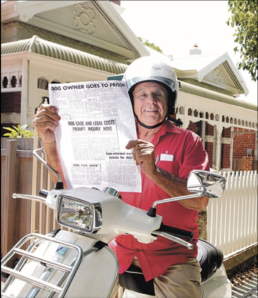These life stories may contain descriptions of childhood trauma and abuse, as well as images, voices and names of people now deceased. If you need help, you can find contact details for some relevant support services on our support page.
Activist Brian Tennant (1935-2019) was in kinship care, orphanages, and children’s homes as a child.
As an infant, Brian’s mother, Aboriginal Australian Ivy Tennant, was single, in and out of hospital, and unable to care for Brian. She sent him to live with her sister, Aunty May, who became unable to care for Brian due to financial constraints. Brian became a Ward of the State at age one and was placed in the St Vincent’s Foundling Home in Subiaco, Perth, Western Australia.
Brian’s earliest memories of St Vincent’s are happy ones. His mother came to visit almost every Sunday and brought him sweets. She had also been in an orphanage as a child. At the age of six, Brian was transferred to other boys’ homes where he was subjected to racist bullying. Brian’s mother and her partner lived in a shop front and were unable to take Brian home. Brian did not meet his father, an immigrant from Yugoslavia, until later in life.
At age sixteen, Brian got a farm job through the Welfare Department. He went on to work in a paint factory for forty years until retiring at the age of sixty-two. Brian was active in the workers’ rights movements, and was State President of the Miscellaneous Workers Union for twelve years.
Brian campaigned against injustice in many forms. His career as an activist began in 1971 when he started a petition against a sudden significant hike in the price of railway tickets. He was heavily involved in prison reform activism, including the prominent cases of Aboriginal elder Mr Ward, John Button and Darryl Beamish. He helped get innocent men released from prison and argued for fair treatment of prisoners.
Prisoners shouldn’t be locked away and forgotten by society. We owe them a responsibility to shine a light into the jails, to make sure they’re being treated reasonably and humanely (Civil Liberties Australia).
Brian led a highly-regarded local civil liberties body for twelve years. One of his significant achievements was having the law changed in Western Australia so that convicted prisoners have their sentences date from the first day of detention, not from the day they were sentenced. He helped win compensation for victims of police and prosecutor malpractice.
Brian continued to be an active member of Civil Liberties Australia in his retirement years. He was honoured in the 2015 Australia Day honours list for “significant service to the community, particularly through advocacy roles for improved social justice, law reform and civil liberties”.
Brian was highly active in the local Perth community where he lived until he passed away in August 2019.
References:
Tennant, Brian, & Fitzgerald, Criena. “Brian Tennant interviewed by Criena Fitzgerald for the Forgotten Australians and Former Child Migrants oral history project.” 9 March 2012, National Library of Australia. https://catalogue.nla.gov.au/Record/5822301
“St Vincent’s Foundling Home (1914 – 1971.” Find & Connect, 2021. https://www.findandconnect.gov.au/guide/wa/WE00196
“The man who chases justice, until innocence wins.” Civil Liberties Australia, 2013. https://www.cla.asn.au/Article/2013/130409_Brian_TENNANT.pdf
Thomas, Jason. “Australia Day honours list 2015.” SBS News, 26 January 2015. https://www.sbs.com.au/news/australia-day-honours-list-2015
“TENNANT Brian Funeral Notice.” West Announcements, 21st Aug, 2019. https://www.westannouncements.com.au/browse/funeral-notices/view/tennant-brian
Image available here.
